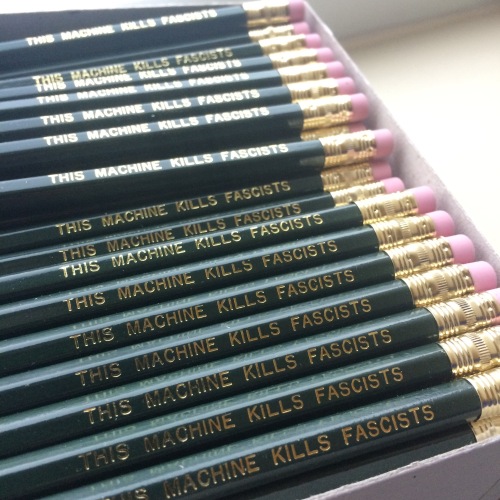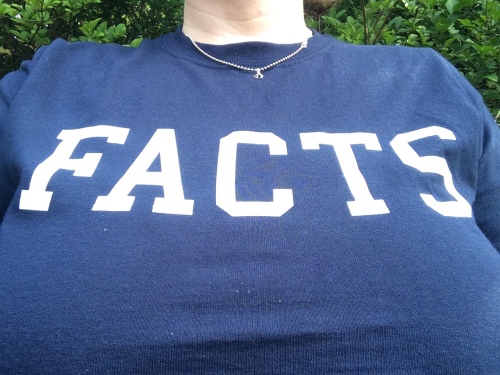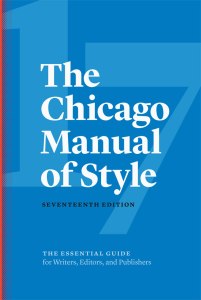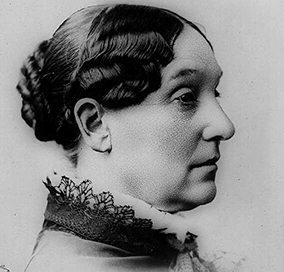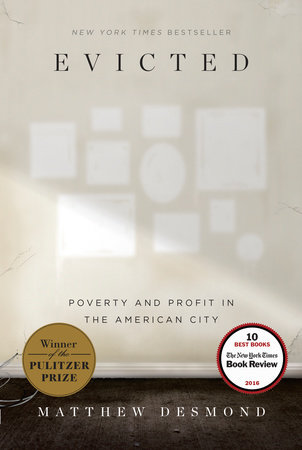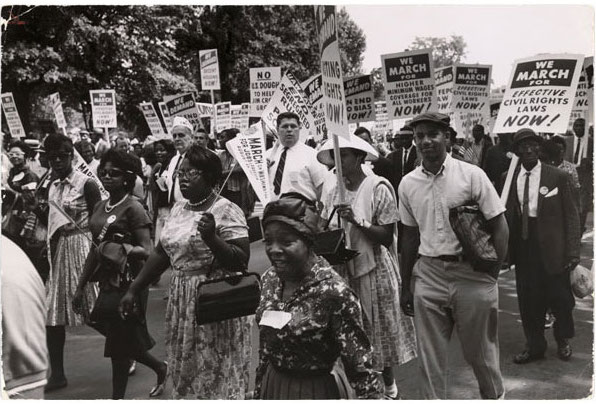
Courtesy of National Archives and Records Administration.
Earlier this week a friend expressed a dawning realization about the realities that black Americans face on a daily basis that she has never had to worry about. She discussed bearing witness to the overpolicing of recent protests she was seeing, and listening to a professor point out that it was just the latest illustration of the plight of black people in America. I wondered whether she had seen Henry Louis Gates interviewed—he’s a nationally known Harvard professor who was arrested by police who believed he was breaking and entering his own house in 2009. Just this morning I watched an interview where SNL comedian Michael Che confessed “I don’t think 9-1-1 is for me.”
One need not look too far to find a person of color who has had a disproportionally heavy-handed interaction with police. Even adorable Amber Ruffin shared her story of being a nervous new teen driver and being targeted by a cop. The Black Lives Matter movement may have started with the death of Trayvon Martin, but Martin’s death was by no means the first young man killed because of his ethnicity.
Pondering, I realized I could help people like my friend—white people who are just opening their eyes to the plight of their fellow man and/or systemic racism, but may need some guidance in learning more. I’ve spent a lot of time over the last 25 years seeking out and absorbing voices of the “other”—racial minorities, QUILTBAGs, women, generally the people who aren’t traditionally covered in public school.
This is another way of saying I totally dig social history, but most people aren’t familiar with that term.
If you don’t understand why people are protesting in such massive numbers, the onus is on you, white person, to educate yourself about these matters. Close your mouth and open your ears. Ask thoughtful and sensitive questions. Seek out work created by someone who is very different than you. Consider discussing with others if you have a difficult time understanding the material. Here in Portland, Multnomah County Library created the Everybody Reads program to feature one book per year in aim of getting more people talking about these less-heard voices.
Following is a list of works I think would have some valuable information for people just starting to learn about the modern black experience, persisting dynamics, and why people are so damn angry right now.
BOOKS:
- The Autobiography of Malcolm X. This is a book I think about frequently. There’s so much to learn! If Malcolm X was discussed at all in schools beside Dr. Martin Luther King Jr., he probably sounded really threatening. Not only had Malcolm parted ways with the Nation of Islam by the end of his life, but the last several pages (written solely by Alex Haley, without Malcolm) are heartbreaking. One of my weirdly-specific favorite passages is when he talks getting his conk done—this passage just skims the surface but black hair in general is definitely a thing that you should know about.
- Sundown Towns: A Hidden Dimension of American Racism by James Loewen documents evidence of “sundown towns”—places where you didn’t want to be out at night if you weren’t white. Loewen narrows the focus of his lengthy book to just the state he was living and teaching in, Illinois—but acknowledges that sundown towns existed in every single US state, and some still do, although not explicitly.
- The March triology. Living legend and current US Senator John Lewis collaborated with artists to produce a trilogy of graphic novels about his life. Each one is packed full of civil rights history and behind the scenes struggles, through the eyes of a young man finding his way through life.
- The Hate U Give. Released in 2017, this young adult book by Angie Thomas caught fire with adults as well. Inspired by the protests in Ferguson, Missouri, readers unfamiliar with 2Pac will never forget what THUG LIFE means—and why it’s important—after reading this book.
- Invisible Man by Ralph Ellison can be a rewarding read, but I’ll admit I had a lot of support to parse it during my freshman year in college. (The literary executor of Ellison’s estate, John Callahan, was a professor at my school.) If I was reading this for the first time I would definitely consider discussing with a book club, and maybe even work from the readers’ guide the publisher provides online.
MAGAZINES:
- The 1619 Project was the vision of Nikole Hannah-Jones, a journalist who has since won a boatload of awards for the work, including a Pulitzer Prize. The very first boat carrying slaves from Africa landed on the shores of Virginia in 1619. Now, 400 years later, slavery still impacts the United States economically, culturally, medically, in housing, and well, the effects of slavery can be seen pretty much everywhere. There’s an accompanying podcast that won an(other) award recently, but it all began in The New York Times Magazine on August 14, 2019. Nikole Hannah-Jones goes by Ida Bae Wells on Twitter, in reference to Ida B. Wells, a 19th century pioneering black journalist you should also get to know.
FILM:
- Roots is entirely worth the many hours you’ll spend watching it. It was a television must-see when it originally aired in 1978, and even today I love it when an unexpected star turns up. I’ve heard the book is amazing as well, and based on Alex Haley’s writing in The Autobiography of Malcolm X, I believe it. But I have watched the Roots miniseries at least twice and have not yet read the book.
- Do the Right Thing made a huge splash when it was released in 1989, and is still entirely relevant today. Spike Lee intentionally plays with his audience’s assumptions about a key character depending on their color. Anyone familiar with Eric Garner’s death will be haunted by a contemporary viewing of this movie. Definitely a movie worthy of reflection and discussion with others.
- 13th: Produced and directed by Ava DuVernay, this documentary about the mass incarceration of people of color includes a succinct timeline connecting the Emancipation Proclamation and our current prison system.
PHOTOGRAPHY:
This list was co-curated by Steven Newton!
- James Van Der Zee was part of the Harlem Renaissance, a photographer who took portraits of noted personalities Joe Louis, Marcus Garvey and Bill “Bojangles” Robinson. He also photographed everyday citizens, showing middle-class Harlemites for weddings, church gatherings, and generally looking glamourous.
- Gordon Parks became one of the first well-known black photographers in large part due to his work for Life magazine and some fashion photography for Vogue. He documented the civil rights era, gained rare access to Malcolm X and the Nation of Islam as well. His early work included American Gothic, Washington, D.C. and a series later published as Segregation Story. If you’ve seen the movie Shaft, you’ve seen his directorial debut!
- Long-time New York Times photographer Don Hogan Charles photographed civil rights issues, but even on a daily basis he tended to photograph people of color more frequently than his largely white counterparts. His most famous photograph seems eerily timely at the moment.
- Representation is important, so Carrie Mae Weems created the Kitchen Table Series in 1989 to show black women in photography. In the process she provided visual commentary on gender, race, and relationships.
Even though I’ve exposed myself to a lot of these voices over the years, I am by no means an expert. Hell, I have yet to read James Baldwin, Zora Neale Hurston, or Maya Angelou! There are other books about white privilege I haven’t gotten to yet either.
Educating yourself about new things can be a long (but rewarding!) process, so I think it’s helpful if someone can help steer you at certain points along your journey. If you have questions about any of the above recommendations or other cultural questions, ask them and I’ll do my best to help. Or if you’re not totally new to these ideas, feel free to comment with your recommendations as well!
Personal storytelling is an engine of humanization, which is in turn an engine of empathy.
Lindy West, The Witches Are Coming

